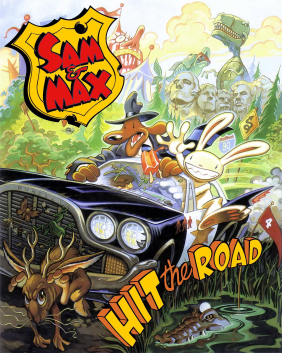
Sam & Max Hit the Road is a graphic adventure video game released by LucasArts during the company's adventure games era. The game was originally released for MS-DOS in 1993 and for Mac OS in 1995. A 2002 re-release included compatibility with Windows. The game is based on the comic characters of Sam and Max, the "Freelance Police", an anthropomorphic dog and "hyperkinetic rabbity thing". The characters, created by Steve Purcell, originally debuted in a 1987 comic book series. Based on the 1989 Sam & Max comic On the Road, the duo take the case of a missing bigfoot from a nearby carnival, traveling to many American culture tourist sites to solve the mystery.

Discworld is a point-and-click adventure game developed by Teeny Weeny Games and Perfect 10 Productions and published by Psygnosis. It is based on Terry Pratchett's novels of the same name. Players assume the role of Rincewind the "wizzard", voiced by Eric Idle, as he becomes involved in exploring the Discworld for the means to prevent a dragon terrorising the city of Ankh-Morpork. The game's story borrows elements from several Discworld novels, with its central plot loosely based on the events in Guards! Guards!
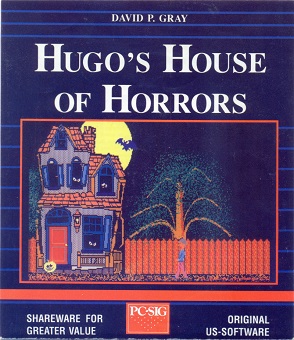
Hugo's House of Horrors is a parser-based adventure game designed by independent software developer David P. Gray and published as shareware in 1990. The game follows the character Hugo as he searches for his girlfriend Penelope in a haunted house. To progress through the game, the player uses items and interacts with the environment to solve puzzles and access more rooms in the house. The gameplay was inspired by Leisure Suit Larry in the Land of the Lounge Lizards. Hugo's House of Horrors was praised for its environment and atmosphere, but it was criticized for its plot and visual design. It was followed by two sequels: Hugo II, Whodunit? and Hugo III, Jungle of Doom!, and a spin-off first-person shooter game, Nitemare 3D.

An American Tail is a 1986 American animated musical adventure film directed by Don Bluth and written by Judy Freudberg and Tony Geiss from a story by David Kirschner, Freudberg and Geiss. The film stars the voices of Phillip Glasser, John Finnegan, Amy Green, Nehemiah Persoff, Dom DeLuise, and Christopher Plummer. It is the story of Fievel Mousekewitz and his family as they emigrate from Russia to the United States for freedom, but Fievel gets lost and must find a way to reunite with them.

Capstone Software was a subsidiary of IntraCorp, a Miami-based computer and video game company. Founded in 1984, Capstone created first-person games such as Corridor 7: Alien Invasion, Operation Body Count, William Shatner's TekWar and Witchaven, and is also known for releasing games based on movie/TV licenses. Capstone's first-person games used the Wolfenstein 3D engine, and later, the Build engine.

Veil of Darkness is a horror-action-adventure game for MS-DOS, FM Towns and PC-98, which was developed by Event Horizon Software and published by Strategic Simulations in 1993. Veil of Darkness is a third person, 2D point-and-click adventure game with RPG elements featuring a fixed isometric perspective and a fair share of action-RPG style combat.
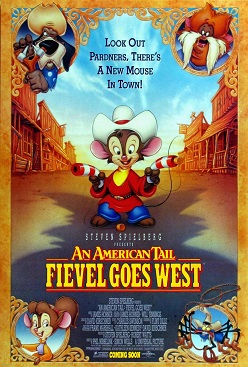
An American Tail: Fievel Goes West is a 1991 American animated Western comedy film directed by Phil Nibbelink and Simon Wells, with producer Steven Spielberg for Amblin Entertainment and animated by his Amblimation animation studio and released by Universal Pictures. A sequel to 1986's An American Tail, the film follows the story of the Mousekewitzes, a family of Russian-Jewish mice who emigrate to the Wild West. In it, Fievel is separated from his family as the train approaches the American Old West; the film chronicles him and Sheriff Wylie Burp teaching Tiger how to act like a dog.

Cosmic Osmo and the Worlds Beyond the Mackerel is a graphic adventure computer game for the Macintosh computer line created by Cyan, Inc. It was published in 1989 and won the 1990 Mac User's Editors' Choice Award for the "Best Recreational Program" category.

King's Quest VI: Heir Today, Gone Tomorrow is a point-and-click adventure game, first released in 1992 as the sixth installment in the King's Quest series produced by Sierra On-Line. Written by Roberta Williams and Jane Jensen, King's Quest VI is widely recognized as the high point in the series for its landmark 3D graphic introduction movie and professional voice acting. King's Quest VI was programmed in Sierra's Creative Interpreter and was the last King's Quest game to be released on floppy disk. A CD-ROM version of the game was released in 1993, including more character voices, a slightly different opening movie and more detailed artwork and animation.
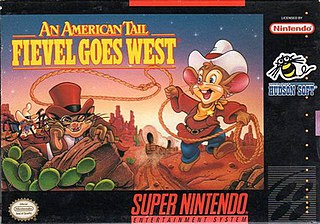
An American Tail: Fievel Goes West is a Super NES video game released in 1994. It is the second game released based on the film of the same name, the other title being an adventure game for DOS, published by Capstone Software.
There have been a variety of Sesame Street video games released for video game platforms. Most of the Sesame Street video games were published and developed by NewKidCo.
An adventure game is a video game genre in which the player assumes the role of a protagonist in an interactive story, driven by exploration and/or puzzle-solving. The genre's focus on story allows it to draw heavily from other narrative-based media, such as literature and film, encompassing a wide variety of genres. Most adventure games are designed for a single player, since the emphasis on story and character makes multiplayer design difficult. Colossal Cave Adventure is identified by Rick Adams as the first such adventure game, first released in 1976, while other notable adventure game series include Zork, King's Quest, Monkey Island, Syberia, and Myst.

Eternam is a graphical adventure game from Infogrames, released originally in 1992 for MS-DOS. A CD-ROM version with full speech was published in 1993. The game was developed by Hubert Chardot, who is better remembered from his Lovecraft-themed games Shadow of the Comet and Prisoner of Ice. While the game is mainly a two-dimensional adventure game, it contains a three-dimensional subgame, which pays homage to Drakkhen, a roleplaying game from Infogrames. This game was re-released digitally on GOG.com in mid 2019.
An American Tail is a franchise based on the 1986 animated feature film of the same name directed by Don Bluth and produced by Sullivan Bluth Studios/Amblin Entertainment.
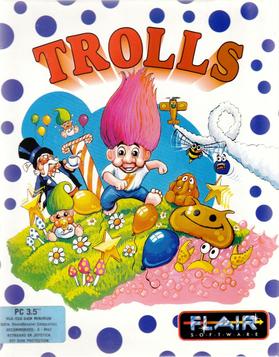
Trolls is a Troll doll-themed platform game developed and published by Flair Software for the Amiga, MS-DOS and Commodore 64 in 1992. In 1994 it was ported to the CD32.
Detective Barbie is a series of three mystery themed point and click adventure games starring the character Barbie. The series consists of Detective Barbie In the Mystery of the Carnival Caper! (1998) Detective Barbie 2: The Vacation Mystery (1999), and Detective Barbie: The Mystery Cruise (2000). The first two games were developed by Gorilla Systems Corporation and published on the PC by Mattel Media/Mattel Interactive. The third game was developed for the PlayStation by Runecraft.
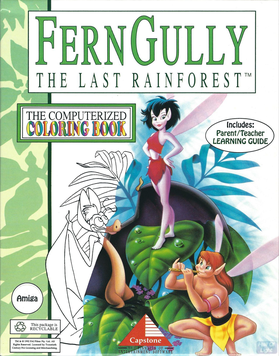
Computerized Coloring Books is a collection of three games developed by Capstone Software and published by its parent company IntraCorp for MS-DOS and Amiga. A port for Windows 3.1 was planned but never released. The games are based on Bill Kroyer's film FernGully: The Last Rainforest, Don Bluth's film Rock-a-Doodle, and John Hughes's film Home Alone. The Rock-a-Doodle game was as released with Trolls and An American Tail: The Computer Adventures of Fievel and His Friends on the Capstone CD Game Kids Collection.

The Mario's Early Years! series is a trilogy of point-and-click educational games released on MS-DOS and Super Nintendo Entertainment System by The Software Toolworks. The three games consist of Fun with Letters, Fun with Numbers and Preschool Fun.
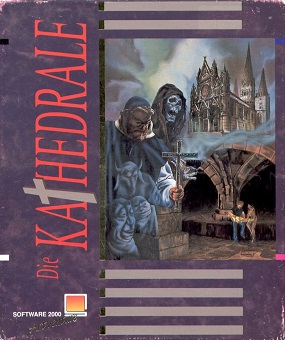
Die Kathedrale is a 1991 German text adventure game developed by Weltenschmiede and published by Software 2000 for the Amiga and DOS. Die Kathedrale is part of a text adventure trilogy; it is preceded by Das Stundenglas (1990) and succeeded by Hexuma (1992). The trilogy lacks an overarching plot, and in each entry the setting, role of the protagonist, and goal differ between each game. Games in the trilogy do not require knowledge of the other entries and may be played as standalone games.

The Dark Half is a 1992 video game published by Capstone Software. The game is based on Stephen King's 1989 novel The Dark Half.
















